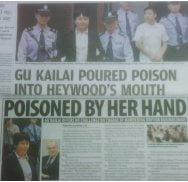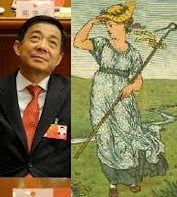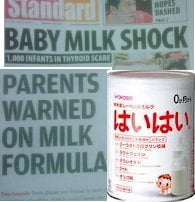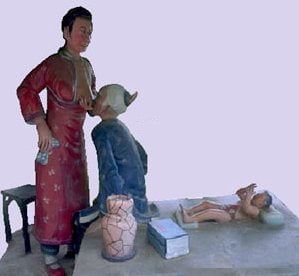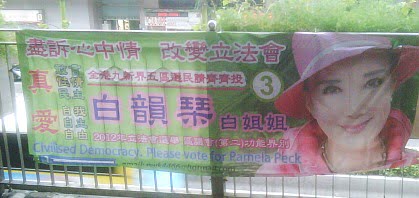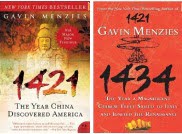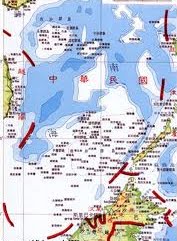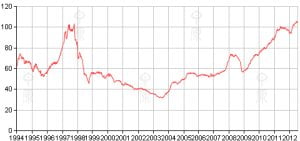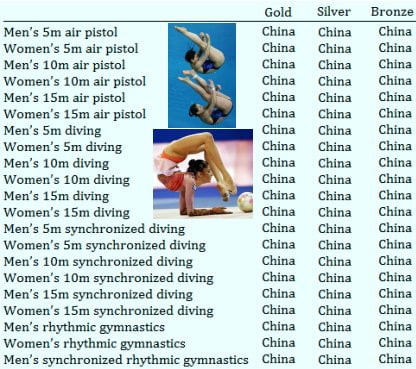People’s Daily subsidiary Global Times declares that Chinese people aren’t upset about their country’s second-place ranking at the end of the ‘contest of national strength’ that is the Olympic Games. This is presumably the official face-saving line in reaction to a self-perceived humiliation that leads young nationalists to fume “…the West must be satisfied that we were defeated by the US.” The correct response would be that it is not a contest of national strength at all (the UK came third and India 55th). But to insecure China with its paranoid government, it must be.
Every country’s reaction to the Olympics probably tells us something about a collective national psyche. The US, to the extent it cares, seems reassured to be top, while the British appear bemused by their success, and the fifth-placed Koreans perhaps understandably impressed with themselves. Hong Kong is over the moon with one bronze. In all these cases the mood is positive. Not so in the country that came second; it is in a huff, whining about foreigners’ unfair treatment of Chinese athletes, and how the nation must not ‘fall into the trap’ of blindly obeying global rules. (There is also some questioning of such thinking going on.)
What is slightly jarring is that our very own South China Morning Post feels a need to get into this morose spirit in an editorial that sounds straight out of Xinhua…
 The front-page story emphasizes China’s sportsmen, while the whole back page is dedicated to China’s, and only China’s, gold medal winners – echoing the fetish with coming first that even some Mainlanders in the Daily Beast article are criticizing. “The scale of [the athletes’] endeavour and achievements cannot be denied,” it insists. (And what on earth is it with this medal-biting thing? Come back ‘V’ sign, all is forgiven)
The front-page story emphasizes China’s sportsmen, while the whole back page is dedicated to China’s, and only China’s, gold medal winners – echoing the fetish with coming first that even some Mainlanders in the Daily Beast article are criticizing. “The scale of [the athletes’] endeavour and achievements cannot be denied,” it insists. (And what on earth is it with this medal-biting thing? Come back ‘V’ sign, all is forgiven)
It is jarring for the same reason much of the SCMP’s China coverage has appeared odd ever since some time back in the 1990s when daily reports from far-flung Mainland provinces and cities started to appear. The paper’s readership is mainly Hong Kong Chinese (many educated in a Western style), with a sizable minority of Westerners. Apart from what seems to be a handful of vociferous patriotic letter-writers, most of these readers are going to be unmoved, and possibly not all that interested, in such China-centric coverage. But the paper has little choice: Hong Kong is a part of the PRC – what country do you expect one of its newspapers to cover in depth? The fault lies with the Hong Kong public, in effect, for not being Chinese enough. Yet another sign of how desperately we need national education, because, as we all know, you can enhance people’s emotional attachment to their country through classroom lessons.
China’s latest batch of astronauts have just passed through town, and the country’s Olympic medalists will be coming in a couple of weeks. The idea is that these high-profile visits will somehow inspire a spirit of shared nationhood with the Mainland, and maybe make us want to vote for pro-Beijing candidates at the September 9 Legislative Council elections. Maybe school children will be drafted in to enlarge the happy smiling flag-waving crowds, as with the Olympic flame four years ago. But is there any way to drag SCMP readers into taking an interest?
There is. The national heroes are a bit boring (unless you want to hear about having chili sauce in orbit), but Hong Kong has its own way to spice up these contrived appearances: demonstrations. In the astronauts’ case, protestors complained about the faking of a harmonious environment, and national education in general. For activists to picket the athletes would be churlish, and probably counterproductive. But at least we’d want to read about it.


